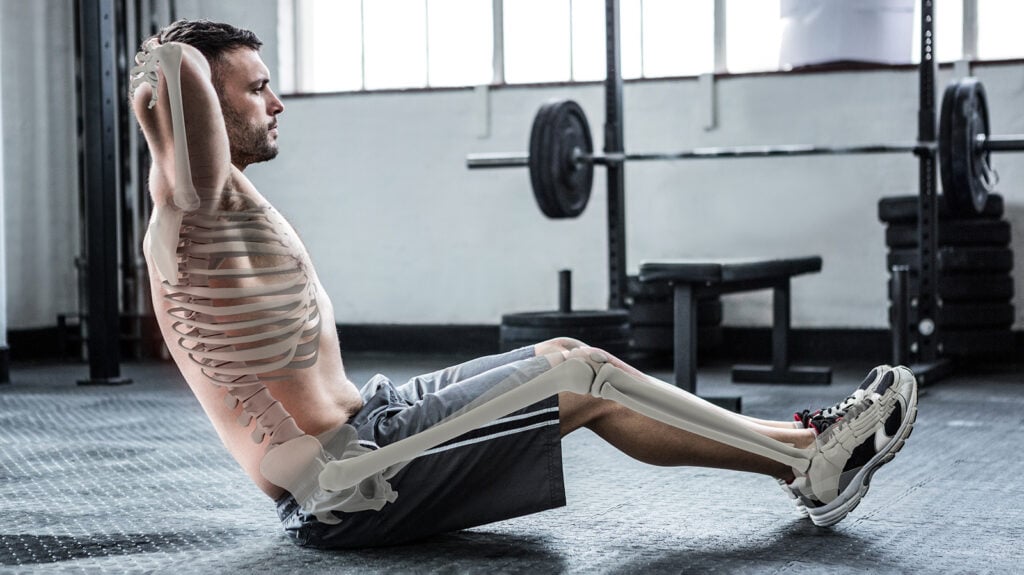What do you need for healthy bones, and what types of food should you be avoiding?
Your bones are like living cities, always rebuilding and repairing themselves and exchanging materials with their environment – discover what they need to stay strong!
Healthy bones
Your skeleton gives your body its shape, houses and protects your organs, gives your muscles something to cling to, and stores minerals such as calcium and phosphorus.
In the center of your bones (some of them) is red bone marrow which is responsible for producing blood cells so your skeleton is much more than just a collection of bones – it is a living network of cells, protein fibers, minerals, and blood vessels.
As bones grow, become worn, or suffer minor damage from physical activity, they are constantly repaired. Damaged bits are cleared away and new bone is built in the gaps.
This allows bones to adapt to the changing demands placed on them. For example, if you start a new sport that puts unusual pressure on your bones, their architecture will slightly rebuild to make them better suited to the new challenges.
Calcium
There’s no denying that we need calcium for healthy bones. It’s the most abundant mineral in your body and some 99 percent of it is in your skeleton.
The rest floats around in the blood and is used by your muscles, nerves and for many biochemical reactions. We need around 700 milligrams of calcium a day.
The best plant sources are almonds, sesame seeds, and tahini, chia seeds, beans, calcium-set tofu (that’s most of the tofu on the market), dried figs, oranges, kale, broccoli, Brussels sprouts, plant milk fortified with calcium, and some fortified breakfast cereals.
The recommended daily dose is achievable entirely through diet. If you take a multivitamin supplement that contains calcium, that can contribute a little but you should not take a high-dose calcium supplement as intakes of over 2,000 milligrams a day may be dangerous.
Anything that can affect calcium levels in the body – food, lifestyle, or medication – has an impact on your bones.
If you lose more calcium than you’re receiving, over time it can result in bone loss leading to osteopenia (the forerunner to osteoporosis) and it can happen at any age.
So, it’s easy to ensure you get sufficient calcium but how do you make sure you’re not flushing it out of your system at the same time? How can that possibly happen?
Animal products and foods to avoid
If your diet includes animal protein from meat and dairy, during digestion it produces acid and your body has to neutralize it as maintaining an acid-alkaline balance is essential to it.
If there isn’t sufficient calcium readily available in your blood and muscles, bone calcium may be extracted and used. And this is where plant-based diets win big-time!
They don’t cause this acid imbalance in the first place because of all the alkaline salts contained in fruit and vegetables and other wholesome plant foods rendering neutralizing unnecessary.
What’s more, they provide many nutrients that bones need. This marks a sharp distinction between foods from animals and foods from plant sources – animal protein may damage bones while plant protein protects them.
Having said that, a plant-based diet isn’t always great for your bones. Sugary and processed foods, fizzy drinks, caffeine, and high salt intakes can cause calcium loss.
If your staples are biscuits, chips, pot-noodles, sweets, and coke, your bones may be in trouble.
If you’re also a smoker, it gets worse as smoking reduces calcium absorption from food. Luckily, all this is easily remedied with diet and lifestyle changes.
One more important point: you cannot utilize calcium without vitamin D…
Vitamin D
This vitamin is essential for calcium absorption but also helps to keep it in the body and regulates calcium blood levels.
In spring and summer, we mostly get vitamin D through exposing our unprotected skin to sunlight, which triggers vitamin D production in the body.
Fair-skinned people need about 15-20 minutes of face and arms exposure, two to three times a week. But the darker your skin, the longer the exposure you need. About 30-40 minutes should be sufficient for most dark-skinned people.
Of course, there is a problem – in autumn and winter, we not only cover up more than in the summer but the sun doesn’t shine as strongly and therefore we don’t make enough vitamin D as a result.
That’s why it’s recommended that everyone, regardless of diet, takes a vitamin D supplement from October to April. People who always wear sunscreen, cover-up, or work indoors should take a supplement throughout the year.
Vitamin D is so important that even if you have plenty of calcium in your diet, you won’t be able to use it properly without this essential vitamin.
The consequences are extremely serious, possibly resulting in rickets or osteomalacia – softening of the bones.
A supplement providing 10 micrograms (400 IU) is sufficient for most people and you should never go above 100 micrograms as high doses can be toxic.
Vitamin D is essential for healthy bones and teeth but that’s not where the story ends. We also need it for a strong immune system and having healthy vitamin D levels has been shown to lower your risk of depression, cognitive decline, cancer, heart disease, and diabetes.
So, make sure you get enough!
Vitamins
To be healthy, your bones need a wide range of nutrients – more than simply calcium and vitamin D!
They also need vitamins A, C, K, and the B group as well as minerals, such as magnesium, potassium, selenium, boron, iron, copper, and zinc.
A wholesome plant-based diet provides all these if it’s centered around fruits and vegetables, pulses, whole grains, nuts, and seeds with the obligatory supplement top-ups of vitamins D and B12.
A word of caution – alcohol consumption is bad for bones so go easy on it!
Exercise
Bones respond to how they are used so physical activity is also a key player. Any weight-bearing exercise, such as walking, running, dancing, yoga, ball games, gym classes, or even gardening, stimulates your bones. This makes them stronger, while a sedentary lifestyle can weaken them.
Unfortunately, swimming or cycling don’t count because you’re not carrying your full body weight. So, if these are your thing, compliment them with another activity.
If you treat your bones right, they will stay strong well into old age. Feed them the good stuff, move them about, don’t smoke and you’ll reap the rewards!
This article has been republished with permission from Viva! Read the original piece here






